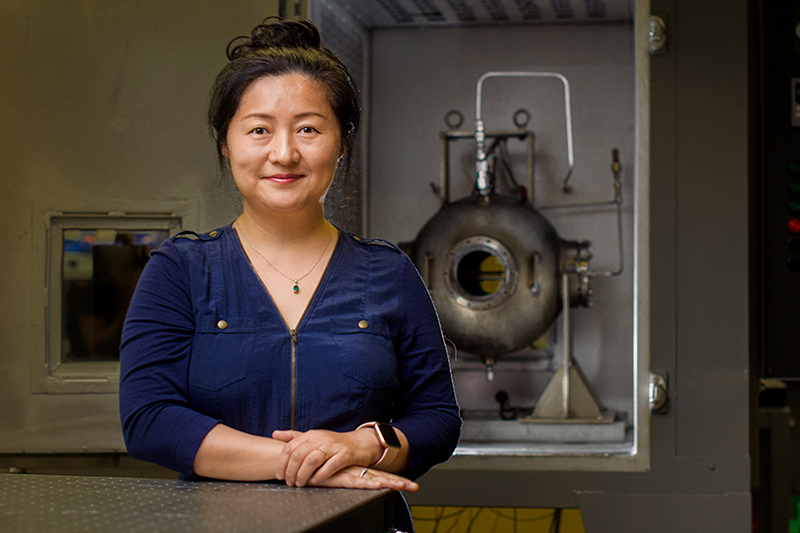February 27, 2024
Patented Purdue design inspired by Tesla valve could improve performance of rotating detonation engines

Li Qiao, a professor in Purdue University’s College of Engineering, is testing a Tesla valve-inspired design to improve the performance of rotating detonation engines. (Purdue University photo)
Researchers are testing an injection manifold design that prevents the reversal of fuel and oxidizer flows
WEST LAFAYETTE, Ind. — Researchers in Purdue University’s College of Engineering are testing a patented Tesla valve-inspired injection manifold design that could improve the performance of rotating detonation engines. RDEs are being developed as next-generation solutions in the field of jet and rocket propulsion.
Li Qiao, a professor in the School of Aeronautics and Astronautics, is conducting numerical demonstrations on the design.
RDE benefits and drawbacks
Qiao said RDEs convert chemical energy into thrust, with a flame traveling through the engine at supersonic speed, which can be 10 times faster than in a traditional engine.
“RDEs are much more efficient than traditional engines by consuming less fuel and achieving high power of thrust in much less time,” Qiao said. “An RDE has no moving parts — turbines or compressors — which makes it less complex and less expensive to manufacture.”
Qiao said RDEs face stability drawbacks, however. The pressure behind a detonation wave in the engine is enormous, but there is high pressure on the wave to move backward. That pressure could reverse the flow of the fuel and oxidizer injectors.
“If the injection flow goes backward, the engine can lose power and power generation is lost,” Qiao said. “The pressure may cause oscillation, too, which causes damage to the fuel injection system.”
Tesla valves and RDE applications
Qiao said Purdue’s Tesla valve-designed injection manifold sustains a stable shock wave in RDEs, maintaining detonation and thrust while preventing the reverse flow.
“Tesla valves allow fluids to flow in one direction but make it virtually impossible for them to travel in another,” Qiao said. “Tesla valves are already frequently used in other fluid devices, but ours is the first proposal to use them as injection manifolds in RDEs.”
During numerical demonstrations on the injection manifold design, Qiao discovered in traditional designs that a significant amount of flow made its way back to the inlet where the fuel was injected.
“In tests of the Tesla valve-inspired injection manifold design, very little flow returned to the inlet,” Qiao said. “The majority of flow was self-impinged at the corresponding Tesla valves.”
Qiao and her team are looking to further perfect the design, which can be integrated into existing engine systems.
“We would be happy to work with industry and the federal government to apply this valve concept for specific engines in commercial and defense applications,” Qiao said.
Qiao has disclosed the innovation to the Purdue Innovates Office of Technology Commercialization, which applied for and received a patent on the intellectual property from the U.S. Patent and Trademark Office. Industry partners interested in developing or commercializing the work should contact Matt Halladay, senior business development manager and licensing manager, physical sciences, at mrhalladay@prf.org, about track code 2021-QIAO-69271.
About Purdue University
Purdue University is a public research institution demonstrating excellence at scale. Ranked among top 10 public universities and with two colleges in the top four in the United States, Purdue discovers and disseminates knowledge with a quality and at a scale second to none. More than 105,000 students study at Purdue across modalities and locations, including nearly 50,000 in person on the West Lafayette campus. Committed to affordability and accessibility, Purdue’s main campus has frozen tuition 13 years in a row. See how Purdue never stops in the persistent pursuit of the next giant leap — including its first comprehensive urban campus in Indianapolis, the new Mitchell E. Daniels, Jr. School of Business, and Purdue Computes — at https://www.purdue.edu/president/strategic-initiatives.
About Purdue Innovates Office of Technology Commercialization
The Purdue Innovates Office of Technology Commercialization operates one of the most comprehensive technology transfer programs among leading research universities in the U.S. Services provided by this office support the economic development initiatives of Purdue University and benefit the university’s academic activities through commercializing, licensing and protecting Purdue intellectual property. In fiscal year 2023, the office reported 150 deals finalized with 203 technologies signed, 400 disclosures received and 218 issued U.S. patents. The office is managed by the Purdue Research Foundation, which received the 2019 Innovation and Economic Prosperity Universities Award for Place from the Association of Public and Land-grant Universities. In 2020, IPWatchdog Institute ranked Purdue third nationally in startup creation and in the top 20 for patents. The Purdue Research Foundation is a private, nonprofit foundation created to advance the mission of Purdue University. Contact otcip@prf.org for more information.
Writer/Media contact: Steve Martin, sgmartin@prf.org
Source: Li Qiao, lqiao@purdue.edu

